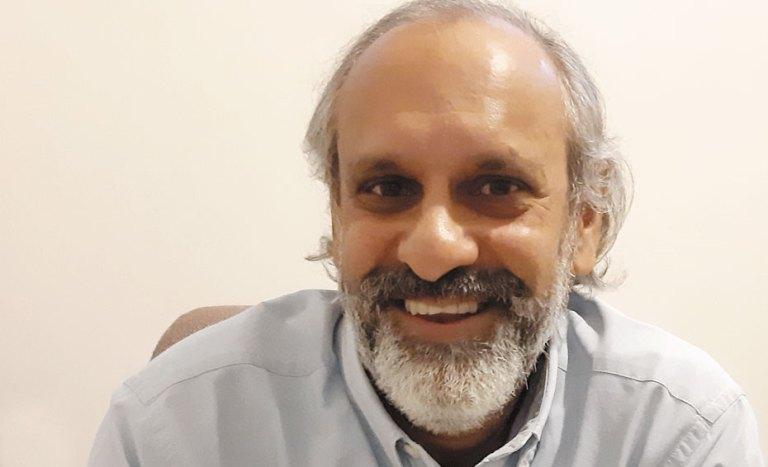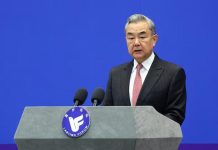Africa-Press – Mauritius. In the elections, Mauritians vote for alternation while retaining the fragile hope that the light of competence will shine at the end of the tunnel. But year after year, citizens question the inability of the current political system to provide them with a better future.
While the arrogance and blindness of the political class is disappointing, it sinks deeper and deeper into the spiral of inefficiency: corruption, lack of integrity, patronage, bad faith negotiations, instigators and arsonists, among others.
Samad Ramoly tells us about it. Mauritius Times: If there is a consensus among many Mauritians as to the need for change, would you like this change to be introduced by democratic means or by “street revolutions”? Samad Ramoly: I adhere to the slogan “I love Moris. Mo ankoler ar bann dirizan ”.
I think this would translate more to a change of system in the sense that we must identify our blockages and dysfunctions in order to act accordingly, restore confidence to citizens and revitalize a country deeply torn.
Our very conception of democracy must go beyond the strict framework of elections. Citizen and institutional vigilance vis-à-vis abuses should be permanent.
That much of the country is plagued with corruption does not surprise anyone, I hope. Of course, the current situation gives the impression of a decadence never reached before.
When I talk about leaders, of course I associate political leaders with big business leaders. The tragedy, as in many countries elsewhere, is that for lack of a credible alternative, we vote by default.
Thus, the anger of the “street” reflects a feeling of exacerbated bad governance in the hope that the message will become as coherent as it is powerful in order to force a radical change in attitude of the ruling elites.
And, best of all, it is about sparking the emergence of a new political force. While the youngest tend to focus on environmental problems, the older ones are very concerned with the high cost of living, the problem of housing, unemployment and social inequalities.
The malaise is very Mauritian. Social inequalities, on the other hand, are a symptom of an excessive concentration of national wealth in the hands of a small handful of families. If the next demonstrations are articulated around this perspective, it is certain to see the partisans of superficial change disappear.
* How do you read the latest manifestations of the “Pou Nouvo Moris” movement and the ambitions of its main organizer, Bruneau Laurette? Surprisingly noted last week in the wake of the turmoil created by the speech of the executive of Altéo Ltée during a lunch on a hunt on the island, it is the fact that Bruneau Laurette was invited into the debate for defend Pierre Noël.
Do you think this is no coincidence, or is it a well-thought-out strategy? With what objective? The “Pou Nouvo Moris” movement was born in the wake of the Wakashio drama.
We should not forget the demonstration organized by the Kolectif Konversasyon Solider on July 11 (which although it did not galvanize the same number of people) was already spreading the feeling of fed up.
In my opinion, this march paved the way. I read this post by Bruneau Laurette with particular attention. I think, like many, he would be lazy thinking if he saw it as just a joke.
We know that the local term “kabri dan lind”, which is not used here, to describe Indians has a strictly negative connotation. While “malbar”, while it can be double-edged, does not strike me as innocent when used here.
It creates the amalgam. Such comments deserve to be condemned. But since we also know that no community has a monopoly on silliness, it is best not to make it an isolated case and reflect on the reason behind such “jokes” and act together to minimize such nonsense.
On the other hand, history shows us that, sooner or later, any deception ends up being exposed. * Faced with Laurette’s position vis-à-vis Christmas, we do not know the reaction of Ashok Subron and Rashid Imrith, especially the latter who said that the march of Mahebourg confirms the achievement of a “big step towards Mauritianism ”.
But it is all the same a strange “Mauritianism” that advocated by the supporters of “Pou Nouvo Moris” to allow oneself to side with the camp of insulting a section of the Mauritian population.
by wrapping himself in the national flag, right?
Already the meaning of “Mauritianism” can vary from person to person. Let’s admit that it signifies an affirmed belonging to the Mauritian nation.
The trivialization of “nou bann” and “bann-la” denotes a withdrawal of identity that wakes up in a period of tension and tension. Somewhere, we are all “closet racists”, that is to say, in private or among our “friends” on Facebook or our contacts on Whatsapp, we convey prejudices and “jokes” about the Other.
The Other can represent a person or a group of people who, according to our openness or our indoctrination, among others, cannot be assimilated to our “tribe” and its values.
Even if these values are navel-gazing, supremacist, etc. Take the example of “nigga”. When a “white” says it, it tends to appeal to the “black”. On the other hand, when the latter pronounces it, it passes.
Why? One explanation would be that the dominate / dominate relationship implements determinism, the belief that our attitudes are written in our DNA and cannot be changed.
On the other hand, there is also fatalism, the belief that our actions do not really matter because whatever is destined to happen will happen. In this case, the reaction may be explosive.
When we live mostly in “tribes”, among our fellow human beings, we do not have enough perspective to realize that we can also internalize toxic values. Very often, by making the Other out of date, we reveal more about our mentalities than those of our target.
When we aspire to live in a “civilized” way, we exercise discernment so as not to nourish and nurture feelings and expressions that can hurt the Other, often the most discriminated against, the most vulnerable or those who feel that their Supposed “privileges” are threatened.
* The Opposition had a “wait and see” position when it started to launch Laurette’s movement, but has since distanced itself. Does she have reasons to fear a crumbling of her electoral base? The opposition is clearly in solicitation mode.
This is understandable because it is an important link in the construction of this system which has been running out of steam for a long time, except that it has convinced a good part of the population – like this current government, moreover – that progress necessarily rhymes with with structural development.
It does not matter if standards are not met, costs are not controlled, projects are unnecessary, transparency does not matter and commissions determine the allocation of contracts.
I am convinced that the majority of the Mauritian electorate would vote for a team of credible candidates, regardless of their ethno-religious affiliation, as long as the project for society is detailed and in line with their expectations.
The Opposition would be a follower of “business as usual” if it is not able to come forward to show us how, once in power, it will go about, among other things,
practice absolute transparency in the use of our money and the private financing of elections with a legal framework;
reduce the number of ministries, the salaries of ministers and deputies;
limit the mandate of all parliamentarians;
stabilize our currency like Singapore, Hong Kong or Estonia because a deliberate policy of depreciation stimulates a vicious spiral and does not contribute to productivity gains, which is the main source of competitiveness gain;
stop all “waterfront” land development and land project permits for foreigners.
So, in your opinion, identity politics is not inescapable? Let me clarify my thinking. If we reduce a person’s identity to their ethno-religious dimension alone without integrating their gender and social position, I think we are moving away from what constitutes their existence. So it is not identity politics per se that is harmful, but the instrumentalization of the components of our identities for divide and rule.
I understand that the current situation requires more consideration in identification because the reward system in relation to our contributions has never been so biased in favor of “endemic parasites”, ie Big Business, and ” chronic parasites ”which revolve around the political power of the moment.
It is very unfortunate that 52 years of politics – sometimes enlightened, but unfortunately too often ill-inspired – have weakened our lakorite and under-exploited the rich and creative energies of our multiculturality.
It’s heartwarming, from what I’ve read in the press, that Jean-Claude de Estrac and Arvin Boolell have changed their minds about updating the community census.
I don’t see how to overcome discrimination, for example, by being color-blind. The Canadian model of multiculturalism and citizenship can guide us. We are very late, like France, compared to post-colonial studies and white privilege remains taboo. It is time to face reality in all its complexity, however trying to avoid a binary approach.
* The question of political recovery of this movement by Bruneau Laurette probably no longer arises today, since the main organizer and his supporters have probably given themselves a political ambition, but should we anticipate a recovery by Big Business and the Church?
I heard Bruneau Laurette say on the radio that he wouldn’t want to be active and partisan. He rallied a good part of the Afro-Mauritian population. Rezistans ek Alternativ and some trade unionists joined him to form a movement together.
It is not because its “base” is above all a specific community that we should attribute to it sectarian and demagogic intentions. The main thing, for him, would be to convince the entire population through his words and actions that his momentum remains national.
Now, it would be a shame if it were instrumentalized by Big Business and the Church. At this stage at least, this possibility does not seem obvious to me. Let’s wait to see more clearly!
* A careful reading of the comments in the so-called independent press makes it clear that big business would not be comfortable with the government’s decision to delay the full opening of our borders.
This is scheduled, according to the Government, on a date to be determined in light of the evolution of the Covid-19 pandemic. “Our priority will remain the protection of our population,” read a press release from the PMO.
Do you think the government is right? No one can claim to be in control of this situation. We will not be able to keep our borders closed indefinitely.
It’s about creating the conditions to minimize risk and optimize the appropriate use of contact tracing technology. On the one hand, the Government has proceeded and still persists with fear mongering.
It does not prepare the population to live with Covid-19. That being said, once our borders open, I believe cases of Covid-19 will be inevitable. On the other hand, it would be a difficult task to convince ourselves that our health service can respond effectively to a high number of cases. That hoteliers in general are nervous about this situation is legitimate.
On the other hand, one can also understand the skepticism as for certain groups which wish to benefit without constraint from the financial assistance of the State whereas the dividends paid over several years and the investments are also disproportionate and their cash flow is so illiquid.
* Do you see this as a unique opportunity to advance the program of democratization of the Mauritian economy launched by Labor without much success?
Economic democratization, the Maurice Ile Durable project, the Truth and Justice Commission, the Equal Opportunities Commission, the Competition Commission, the Empowerment program, etc.
, are very laudable initiatives. But why have these potential game changers failed to meet our aspirations?
I think that the break announced with a development model, which was fundamentally only a mirage, did not benefit from the then Prime Minister of the leadership and management that such a profound change had need.
On the contrary, this break was put under ideological, dogmatic and academic inspiration with the main emphasis on “Put Big Business First”, the opposite of the Singaporean approach, to take an example.
The obsession that still persists for the “benchmark” Ease of Doing Business – more and more disowned internationally – is not helping to boost our local productivity and our international competitiveness.
Heavy bureaucracy is a definite constraint. What about the operating costs of businesses? What about the affordability and quality of food, housing, public transport, education, etc.
, of households and individuals?
It is above all not enough to fantasize about the disappearance of corruption and communalism or to brandish without any anthropological and neuro-scientific consideration “rather learn to fish than to give a fish”.
It is the implementation of a set of conditions, capable of creating synergy between all stakeholders, that can free us from this vicious circle. Identification with the Nouvo Moris project cannot be decreed.
If only! * Can we predict how the post-Covid situation will be socially, economically and politically, in your opinion? The next few months are clearly going to be more difficult than they could and should have been if our ruling elites had not focused our resources on concreteizing the country, for example.
The complacency of the majority of our opinion leaders and other Zistwarans towards our “miracle”, the brutal deindustrialization and our outdated supply chains must also be highlighted. Our integration, even if temporary, among high-income countries is the spitting image of “lies, damned lies and statistics”.
Can you imagine, say, wealthy Norwegians showing off their super luxury cars without being the victims of reverse snobism, that is, without arousing contempt? On the contrary, the incentives to revitalize smart cities for foreigners have been boosted despite a modified demand according to post-Covid requirements.
The leadership of Angela Merkel and Jacinda Ardern, without idealizing her – which is neither divisive nor empathizing with fat cats but shows a certain wisdom – deserves our attention.
When we internalize in our behaviors that we are interconnected, we ensure that only the positive energies of the national system are connected. Here, we are talking about localism, food sovereignty, the blue economy and reindustrialisation, but always in an existential balance.
Just to survive. And, in return, to hijack the national wealth on the sly, legally and with impunity. Integrated and visionary approach, manze bwar sa? My faith, what a waste! Strongly this virtuous cycle.
For More News And Analysis About Mauritius Follow Africa-Press







